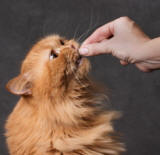|
Need Help?
|
|
Call
1-800-372-3706
to
speak to a Veterinary Behavior Technician |
|
Paws To Speak!
Member Main Menu
|
|
 |
 |
|
Help is at your
fingertips by library, email,
and phone. |
Learn more...
Punishment- Q&A
PPt
Mind & Spirit of Cats

Did you know?
Common Myth:
Cats will eliminate outside of the box,
particularly on the human's bed or clothing out
of spite.

Debunking the
Myth: Cats
are smart but not complex thinkers. Their
prefrontal cortex is only about 3.5% of their
brains. These cats are unhappy, anxious and
stressed and benefit from behavioral treatment
NOT punishment which makes the problem worse.


|
Rewards and Corrections
What is it?
To
develop an IdealCat™
personality, it is very
important
not to not to
hurt, scare or confuse your cat
by applying human punishment
- no exceptions. Cats
do not understand this form of
communication. Instead, they
simply avoid human contact.
Behavior training is vital
education for your cat. However,
the goal is not to force the cat
to conform to regimented
routines Behavior training
is best when it becomes a fun
game for you and your cat.
You help your cat figure out how
to earn food treats by doing
normal behaviors on cue.
Increasing communication with
your cat enriches a cat's life and
improves the relationship
between cats and people,
especially the positive cat
parent.
Most pet parents discover
behavior training one of the
most fascinating and enjoyable
activities shared with a family
pet.
|
Any type of punishment may
temporarily stop a behavior but
it does nothing to correct
or stop the behavior in the long run. Cats
learn better from reward
training. |
Most cats conduct
their lives based on early learning experiences. These normal feline behaviors
may not meet human expectations.
Humans tend to punish by using parts of the human body to cause harm to the cat.
Examples of this are spanking, slapping, shaking, scruffing,
and kicking. These
cause the cat to perceive
people as
threats
and
aggressive. Physical punishment
leads to LESS control over cats.
Hitting a cat
tells the
cat
that
hands and feet of humans are scary. We want your cat to see hands
as a source of friendly and gentle petting., a source of bonding and
something the cat looks forward
to interacting with.
|
IdealCat ™
personalities are based on developing trust in people. |
What to do?
If
you catch your cat
in the act of an unwanted
behavior such as counter-surfing, biting or digging
up potted plants, scratching furniture or stealing
human food off the table, try to interrupt this
behavior without your cat seeing you.


Rewards
-
A reward
is anything your cat enjoys
such as tasty food,
playtime, and stroking. If
your cat isn't social, then
being left alone is a
reward.
-
Cats are
social, do adopt people as
family and therefore respond
well to praise.
|
You can establish feline
law and order in your household
by following the principles of
INTERRUPT,
REDIRECT, and REWARD. |
Normal Cat Development
Adolescence:
17 weeks to 1 year
-
Sexual maturity if not
altered; spraying and
fighting to protect
territory
-
If allowed outdoors, may
wander farther away from
home.
-
Keep a break-away collar
with an identification
tag on at all times.
-
Consider microchip -
permanent identification
- to avoid losing your
cat
AAFP. (2004). Feline Behavior Guidelines. Pg. 10.

|
"Helping you raise a fabulous feline
friend for life." |
|